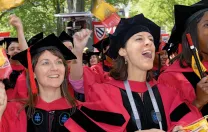Three women and six men received honorary degrees at Harvard’s 356th Commencement. Provost Steven E. Hyman introduced them to the audience, and President Derek Bok read the citations. In order of presentation, the honorands were:

Photograph by Stu Rosner
Daniel Aaron
Daniel Aaron, Ph.D. ’43. A Harvard faculty member since 1971, Aaron was the founding director of the Program in the History of American Civilization and the founding president of the Library of America, and is now Thomas professor of English and American literature emeritus. Doctor of Letters: A man of good hope who speaks to the conscience; an exemplary Americanist whose unassuming erudition joins literature and history in a more perfect union.

Photograph by Stu Rosner
Jocelyn Burnell
Jocelyn Bell Burnell. While a graduate student at the University of Cambridge, she and her supervisor discovered pulsars, launching a new area of astrophysics and gain-ing a Nobel Prize —for her supervisor. She went on to her own distinguished career and has been president of the Royal Astronomical Society. Doctor of Science: An ingenious astrophysicist surveying galaxies with a sense of wonder; she espied something rare in the pulse of strange stars and so solved a cosmic conundrum.

Photograph by Jim Harrison
Conrad Harper
Conrad Kenneth Harper, J.D. ’65. An esteemed lawyer and the first African-American president of the New York City Bar, for the first five years of this decade, he was a member of the Harvard Corporation. Doctor of Laws: Cosmopolitan counselor, bibliophilic barrister, as conversant with Jane Austen as with Austin Hall; his perspicacity, prudence, and devotion to justice have enriched the worlds of law and learning.

Photograph by Jim Harrison
Karen Uhlenbeck
Karen Keskulla Uhlenbeck. The American Mathematical Society awarded her the Steele Prize for her seminal contributions to mathematical gauge theory. “I find that I am bored with anything I understand,” she has written. She holds the Regents Chair in mathematics at the University of Texas. Doctor of Science: Spanning geometry, topology, analysis, and physics, a broad-gauged scholar and inspiring mentor whose manifold mathematical talents know few equals.
Robert B. Silvers. He has been the editor of the New York Review of Books since its first issue appeared in 1963. Doctor of Letters: Incisive and indefatigable editor extraordinaire whose spirit infuses an indispensable journal; an estimable polymath and exacting craftsman who elevates the expression of vital ideas.
Joan Wallach Scott. A pioneer in using gender as a category of historical analysis, she was founding director of the Pembroke Center for Teaching and Research on Women at Brown University and has served since 1985 as a professor of social science at the Institute for Advanced Study. Doctor of Laws: Vivid- ly illumining the in-terplay of differences, unveiling the intricacies of politics and power, she has shown how gender shapes history’s course, while deftly expounding the scholar’s ideals.

Photograph by Jim Harrison
Bill Russell
William Felton Russell. The former center and later head coach of the Boston Celtics, he is a man, said Hyman, “who’s been called ‘the greatest team player on the greatest team ever.’…Throughout, he has been a strong advocate for racial equality.” Doctor of Laws: A Rembrandt of roundball whose championship rings are enough to outnumber his fingers; a peerless team player whose skill and tenacity led even his strongest foes to wilt.
Lawrence H. Summers, Ph.D. ’82. Granted tenure in economics at Harvard before he was 30, later the nation’s secretary of the treasury, then Harvard’s twenty-seventh president, he is now Eliot University Professor. Doctor of Laws: An eminent academic and public servant whose intellect and energy help animate the global economy; a bold university leader whose aims and ideas have pointed Harvard toward high aspirations ahead.
William H. Gates III ’77. The most illustrious member of the College class of 1977 never to have graduated from Harvard at last has a diploma. Doctor of Laws: A hard-driving visionary and icon of entrepreneurship whose prescience has propelled the digital era and whose largesse brings new hope to people in need.






